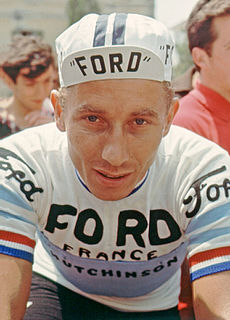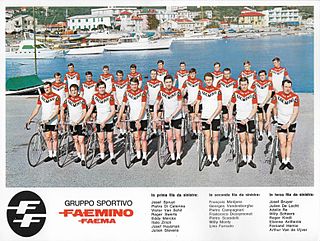Related Research Articles

The Giro d'Italia is an annual multiple-stage bicycle race primarily held in Italy, while also starting in, or passing through, other countries. The first race was organized in 1909 to increase sales of the newspaper La Gazzetta dello Sport; and is still run by a subsidiary of that paper's owner. The race has been held annually since its first edition in 1909, except during the two world wars. As the Giro gained prominence and popularity the race was lengthened, and the peloton expanded from primarily Italian participation to riders from all over the world. The Giro is a UCI World Tour event, which means that the teams that compete in the race are mostly UCI WorldTeams, with some additional teams invited as 'wild cards'.

In road bicycle racing, a Grand Tour is one of the three major European professional cycling stage races: Giro d'Italia, Tour de France, and Vuelta a España. Collectively they are termed the Grand Tours, and all three races are similar in format being three week races with daily stages. They have a special status in the UCI regulations: more points for the UCI World Tour are distributed in Grand Tours than in other races, and they are the only stage races allowed to last longer than 14 days.

The Giro d'Italia Femminile is an annual elite women's road bicycle racing stage race. It was rebranded from 2013-2020 as the Giro Rosa, having been branded the Giro Donne until 2012 and again in 2021. It is considered the most prestigious stage race in women's road cycling.

Michele Scarponi was an Italian road bicycle racer, who rode professionally from 2002 until his death in 2017 for the Acqua e Sapone–Cantina Tollo, Domina Vacanze–Elitron, Würth, Acqua & Sapone–Caffè Mokambo, Androni Giocattoli, Lampre–Merida and Astana teams. He was declared the winner of the 2011 Giro d'Italia after the disqualification of Alberto Contador. Other major results of his career were the 2009 Tirreno–Adriatico, the 2011 Volta a Catalunya and the 2011 Giro del Trentino stage races.
The 1974 Giro d'Italia was the 57th running of the Giro d'Italia, one of cycling's Grand Tours races. The Giro started in Vatican City, on 16 May, with a 164 km (102 mi) stage and concluded in Milan, on 8 June, with 257 km (160 mi) leg. A total of 140 riders from fourteen teams entered the 22-stage race, that was won by Belgian Eddy Merckx of the Molteni team. The second and third places were taken by Italians Gianbattista Baronchelli (Scic) and Felice Gimondi (Bianchi), respectively.
The 1978 Giro d'Italia was the 61st running of the Giro d'Italia, one of cycling's Grand Tours races. The Giro started in Saint-Vincent, on 7 May, with a 2 km (1.2 mi) prologue and concluded in Milan, on 28 May, with a 220 km (136.7 mi) mass-start stage. A total of 130 riders from thirteen teams entered the 20-stage race, that was won by Belgian Johan de Muynck of the Bianchi team. The second and third places were taken by Italians Gianbattista Baronchelli and Francesco Moser, respectively. As of the beginning of the 2021 cycling season this was the last time a Belgian rider won a Grand Tour.
The 1966 Giro d'Italia was the 49th running of the Giro d'Italia, one of cycling's Grand Tour races. The Giro started in Monaco's Monte Carlo, on 18 May, with a 149 km (92.6 mi) stage and concluded in Trieste, on 8 June, with a 172 km (106.9 mi) leg. A total of 100 riders from 13 teams entered the 22-stage race, which was won by Italian Gianni Motta of the Molteni team. The second and third places were taken by Italian Italo Zilioli and Frenchman Jacques Anquetil, respectively.
The 1968 Giro d'Italia was the 51st running of the Giro d'Italia, one of cycling's Grand Tour races. The Giro started in Campione d'Italia, on 20 May, with a 5.7 km (3.5 mi) stage and concluded in Naples, on 11 June, with a 235 km (146.0 mi) mass-start stage. A total of 130 riders from 13 teams entered the 22-stage race, which was won by Belgian Eddy Merckx of the Faema team. The second and third places were taken by Italians Vittorio Adorni and Felice Gimondi, respectively.

The Maiella is a massif in the Central Apennines, in Abruzzo, central Italy.

The 1920 Giro d'Italia was the eighth edition of the Giro d'Italia, a cycling race organized and sponsored by the newspaper La Gazzetta dello Sport. The race began on 23 May in Milan with a stage that stretched 348 km (216 mi) to Turin, finishing back in Milan on 6 June after a 421 km (262 mi) stage and a total distance covered of 2,632 km (1,635 mi). The race was won by the Italian rider Gaetano Belloni of the Bianchi team. Second and third respectively were Italian Angelo Gremo and Frenchman Jean Alavoine.

The Mountains classification in the Giro d'Italia is a secondary classification that is a part of the Giro d'Italia, one of cycling's Grand Tour races. In this classification, points are awarded to the leading riders over designated climbs. The climbs are put into different classifications based on difficulty and their position on that day's stage. Bonus points are given to mountain top finishes and to the first riders over the Cima Coppi, traditionally adjudged as the highest point of the entire Giro.
Emilio Petiva was an Italian cyclist.

Jai Hindley is an Australian professional cyclist who currently rides for UCI WorldTeam Bora–Hansgrohe.

The 2017 Giro d'Italia was the 100th edition of the Giro d'Italia, one of cycling's Grand Tour races. The race started on 5 May in Alghero on the island of Sardinia, and ended on 28 May in Milan. The race was won by Tom Dumoulin, who became the first Dutch male winner of the Giro.

Faemino–Faema was a professional cycling team that existed from 1968 to 1970. Faema's most prominent rider was Eddy Merckx who won his first four grand tours with the team.
Guerrino Tosello is an Italian racing cyclist. He won stage 7 of the 1968 Giro d'Italia.
Lino Farisato is an Italian racing cyclist. He won stage 13 of the 1968 Giro d'Italia and stage 19 of the 1971 Giro d'Italia.
Carlo Chiappano was an Italian racing cyclist. He won stage 10 of the 1969 Giro d'Italia. He also won the 1969 Tirreno–Adriatico. He rode in nine editions of the Giro d'Italia, as well as three editions of the Tour de France.
Andrea Garosio is an Italian cyclist, who currently rides for UCI ProTeam Bardiani–CSF–Faizanè. In May 2019, he was named in the startlist for the 2019 Giro d'Italia.
References
- ↑ "Emilio Casalini". Cycling Archives. Retrieved 15 May 2017.
- ↑ "Giro d'Italia 1968". Cycling Archives. Retrieved 15 May 2017.